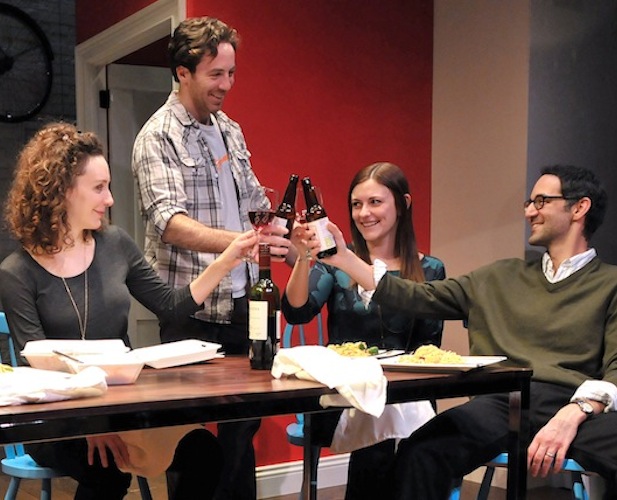Stage Review: A Not-So-Perfect “Future Perfect” at SpeakEasy Stage
Playwright Ken Urban doesn’t seem to have a strong point of view about his thirtysomethings-in-a-muddle; neither does he allow them to change or grow.
A Future Perfect, by Ken Urban. Presented by SpeakEasy Stage Company in the Robert Studio Theatre at the Boston Center for the Arts, Boston, MA, through Feb. 7.

Marianna Bassham, Brian Hastert, Chelsea Diehl, and Nael Nacer in the SpeakEasy Stage Company production of “A Future Perfect.” Photo: Craig Bailey/Perspective Photo.
By Terry Byrne
Ken Urban’s A Future Perfect starts with the potent scenario of longtime friends facing a pivotal point in their lives. But despite some emotional performances in SpeakEasy Stage Company’s world premiere production, the play never gets past serving up well-worn clichés.
The script opens with a quartet of thirtysomething friends having their usual “dinner and game night.” Claire (Marianna Bassham), her husband Max (Brian Hastert) and Alex (Nael Nacer) have been friends since college. Elena (Chelsea Diehl), Alex’s wife, is a newer member of the quartet, and Urban’s dialogue deftly dramatizes the tension among a trio of old friends and one “outsider.” Within a few moments, however, Alex and Elena blurt out the news that they are pregnant, and the quartet suddenly has to grapple with the fractures this new addition will create in their relationships.
There’s lots of room for banter about the terrifying responsibility of raising a child, of whether this was the right decision, of wondering how a baby will fit into their marriage, but Urban doesn’t allow for any ambiguity or subtext. His characters become defined by easy adjectives: both women are various shades of “ballbusters” while the men are spineless. Elena works at the same agency as Claire, and looks up to her for professional advice, while Max and Alex reminisce about their days playing in a band together while Alex sells insurance and Max writes puppet shows for PBS.
Director M. Bevin O’Gara guides her actors to the sharpest edges of their characters, but Urban’s plotline doesn’t support her. Every time the drama seems to head toward an uneasy place where truth might lie, Urban pulls back. Max, in an effort to take a risky political stand, refuses to edit a script geared to the children of veterans. But his script is so toothless that it ends up mocking the risks others have taken for their beliefs. In an odd scene, in which Max rehearses with his young actress (the talented Uatchet Jin Juch) in his apartment, we get to hear a little bit of the dialogue, which is painfully pedantic, and not at all inflammatory.
Marianna Bassham, one of Boston’s most versatile actors, gives Claire some much-needed passion and energy, but when Urban gives her lines like “I will have it all, a kid, a great job …” you may be tempted to hit her over the head with a copy of Sheryl Sandberg’s Lean In.
Although his primary protagonists are Claire and Max, the strongest character in this play is Elena, and Diehl makes the most of her. Elena’s awkward efforts to fit in, followed by her resentment and ultimate fury over Claire’s condescending attitude are among the few scenes in the play where the temperature rises above tepid.
But to get to them we have to wade through long conversations about porn on the internet, a mugging, the excitement over ’90s music (note to dramaturg: the Smiths were popular in the ’80s not the ’90s. And kudos to costume designer Elisabetta Polito, who found a T-shirt from the ’90s band Modest Mouse for Max to wear), and a very weird “I am woman, hear me roar” speech that made me feel some ’70s music might be on the way.
Friends, crises, and dinner parties are a well-worn theatrical trope: see Donald Margulies’s Dinner with Friends or the mother of them all, Who’s Afraid of Virginia Woolf? to name just two. If a playwright chooses to use this well-worn frame, he or she had better have something vital to add to the conversation. But Urban doesn’t seem to have a strong point of view; neither does he allow his characters to change or grow.
Even the evening’s nostalgia feels forced. When Max and Alex start jamming on their electric guitars, there’s no passion for the music or even much of a sense that they are having fun playing together. If the characters aren’t invested in their dreams, why should we be?
Terry Byrne has been writing about the arts for nearly two decades. She has an MFA in Playwriting from Boston University and is a Resident Scholar at Brandeis University’s Women’s Studies Research Center.
Fuse interview with Ken Urban about A Future Perfect

